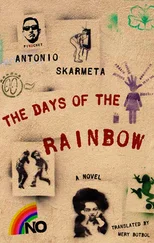Corrado’s voice dropped, perhaps someone had come into the office. “Don’t trust him,” he said. “Don’t trust him an inch.”
“It’s not a question of trusting or not. He gave me a tip and I’m going to try it out. He didn’t know anything about the business. But there’s someone who maybe does know something and he told me who.”
“Who?”
“I told you I can’t tell you, I don’t want to speak on the phone.”
“There’s no one here who can hear you. You can speak on my phone. Tell me who.”
“Come on, you don’t imagine he went and gave me name and surname, do you? He’s very smart. He just gave me an idea.”
“So then give me an idea.”
“You wouldn’t understand.”
“So how come you understood?”
“Because it’s someone I happened to know years back. A musician.”
“Where does he play?”
“Corrado, please, I can’t tell you anything.”
“In any event I don’t like it, and you’re too naive, understand? It’s quicksand. Anywhere you put your feet you risk sinking in.”
“Sorry Corrado, have to say goodbye, it’s getting late. And then this seagull is getting annoyed, he wants to make a call, he’s waving his beak at me furiously.”
“Come straight here, I’ll wait for you at the paper. I won’t go home, just so I can see you.”
“What about tomorrow, okay? I’m tired now, and I’ve got something to do this evening.”
“Promise me you won’t trust anyone.”
“Okay, talk to you tomorrow.”
“Hang on a second, I heard something that might interest you. The coroner has arranged for the burial, the case has been dropped.”

Twenty years ago the Tropical was a small nightclub with a shady atmosphere catering to American sailors. Now it’s called the Louisiana and it’s a piano bar with couches and table lamps. On the drinks list, on a green velvet noticeboard near the main door, it says: Piano player — Peppe Harpo .
Peppe Harpo is Giuseppe Antonio Arpetti, born in Sestri Levante in 1929, struck off the register of doctors in 1962 for his over-lavish prescription of addictive drugs. In his university days he played the piano at little parties. He was quite talented and could do perfect imitations of Erroll Garner. After the drug scandal he took to playing at the Tropical. He played mambos and pop songs through evenings thick with smoke, five hundred lire a drink. The emergency exit, behind the curtains, opened onto a stairwell where, above another door, a neon sign said: Pensione — Zimmer — Rooms . Then at a certain point he disappeared for six or seven years, to America, people said. When he reappeared it was with small round eyeglasses and a greying mustache. He had become Peppe Harpo, the jazz pianist. And with his return the Tropical became the Louisiana. Some said he had bought the place, that he’d made money playing in bands in America. That he had made money no one found strange. He seemed capable of it. That he had made money banging on the piano left many unconvinced.
Spino sat down at a table to one side and ordered a gin and tonic. Harpo was playing “In a Little Spanish Town,” and Spino supposed his entry had passed unobserved, but then when his drink came there was no bill with it. He sat on his own for a long time, slowly sipping his gin and listening to old tunes. Then towards eleven Harpo took a break and a tape of dance music replaced the piano. Spino had the impression, as Harpo came towards him through the tables, that his face wore an expression at once remorseful and resolute, as if he were thinking: ask me anything, but not that, I can’t tell you that. He knows , a voice inside him whispered, Harpo knows . For a second Spino thought of putting the photo of The Kid as a child down on the table and then saying nothing, just smiling with the sly expression of one who knows what he knows. Instead he said straightforwardly that perhaps the time had come for Harpo to return him that favor. He was sorry if that was putting it bluntly. The favor, that is, of helping him find somebody, as he had once helped Harpo. A look of what seemed like genuine amazement crossed Harpo’s face. He waited without saying anything. So Spino pulled out the group photograph. “Him,” he said, pointing at the boy.
“Is he a relative of yours?”
Spino shook his head.
“Who is he?”
“I don’t know. That’s what I want to find out. Perhaps his name is Carlito.”
Harpo looked at Spino suspiciously, as if expecting a trick, or afraid he was being made fun of. Was he mad? The people were wearing fifties-style clothes, it was an old photograph. The boy must be a man now, for God’s sake.
“You know perfectly well what I’m talking about,” Spino said. “He’s got a dark beard now. His hair is darker too, not as light as in the photo, but his face still has something boyish about it. He’s been in my freezer for a few days. The people who knew him are keeping quiet, nothing, not even an anonymous phone call, as if he’d never existed. They’re wiping out his past.”
Harpo was looking around rather uneasily. A couple at a nearby table was watching them with interest. “Don’t speak so loud,” he said. “No need to disturb the customers.”
“Listen Harpo,” Spino said, “if a person doesn’t have the courage to go beyond appearances, he’ll never understand, will he? All his life he’ll just be forced to keep playing the game without understanding why.”
Harpo called a waiter and ordered a drink. “But who’s he to you?” he asked softly. “You don’t know him, he doesn’t mean anything to you.” He was speaking in a whisper, uneasy, his hands moving nervously.
“And you?” Spino said. “Who are you to yourself? Do you realize that if you wanted to find that out one day you’d have to look for yourself all over the place, reconstruct yourself, rummage in old drawers, get hold of evidence from other people, clues scattered here and there and lost? You’d be completely in the dark, you’d have to feel your way.”
Harpo lowered his voice even further and told him to try an address, though he wasn’t certain. His face told Spino that in giving him that address the favor had been repaid in full.

It’s called “Egle’s.” It’s an old pie-house, or that’s what he’s heard people call it. The walls are covered in white tiles and behind a zinc-topped counter Signora Egle bustles about a small wood-fired oven serving cakes and pies. Spino sits at one of the little marble tables and a grey-aproned waitress with the haggard look of a cloistered nun comes with a cloth to wipe up the crumbs the last customer left. He orders a chickpea pie and then, as instructed, lays a copy of the Gazzetta Ufficiale on the table in full view. He begins to check out the other customers and speculate as to who they are. At the table next to his are two middle-aged blonde women chattering in low voices, occasionally exploding in shrill laughter. They look well-heeled and are wearing gauche, expensive clothes. They could be two retired whores who’ve invested their earnings well and now run a shop, or some business related to their previous profession, but dignified now by this façade of respectability. Sitting in a corner is a young lout bundled up in a thick jacket and engrossed in a magazine from the cover of which a fat orange-clad guru wags a warning finger at the plate of pie in front of him. Then there’s a spry-looking old man, hair dyed a black that takes on a reddish tint about the temples, as cheap dyes often do. He has a gaudy tie and brown-and-white shoes with patterns of tiny holes. Wheeler-dealer, pimp, widower in the grip of a mad desire for adventure? Could be anything. Finally there’s a lanky man leaning against the counter. He’s chatting to Signora Egle and smiling, showing off an enormous gap in his upper teeth. He has a horsey profile and greased-back hair, a jacket that doesn’t manage to cover his bony wrists, jeans. Signora Egle seems determined not to concede something the lanky character is insisting on. Then, with an expression of surrender, she moves to one end of the counter and puts a record on a decrepit phonograph that looked as if it were purely decorative. The record is a 78 and rumbles; there are a couple of bursts from a band and then a falsetto voice starts up, distorted by the scratches the disc carries in its grooves. Incredibly, it’s Il tango delle capinere , sung by Rabagliati. The lanky character sends a nod of complicity in the direction of the waitress and she, unresisting but sullen, lets herself be led in a long-stepping tango that immediately captures the attention of the clientele. The girl leans a cheek on the chest of her beau, which is as far as her height allows her to reach, but she’s having all kinds of trouble keeping up with his powerful strides as he leads her aggressively about the room. They finish with a supple casqué and everybody claps. Even Spino joins in, then opens his paper, pushing his plate away, and pretends to be absorbed in the Gazzetta Ufficiale .
Читать дальше













